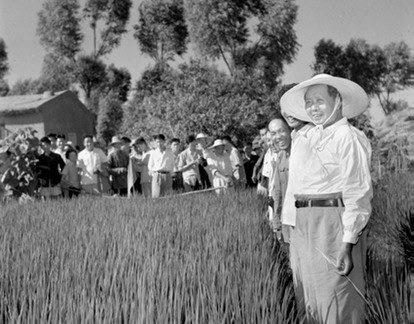The New Yorker, 7 September 2010
Of Feast and Famine
If you’re ever puzzling over a turn in Chinese behavior or decision-making, it is often a good idea to check for clues in the political history of Chinese food. When Chairman Mao declared, “A revolution is not a dinner party,” that was his way of warning people not to expect excessive civility in the course of transforming the country.
Alas, it was a tragic understatement. As historians have only begun to detail, Mao Zedong’s economic policies from 1958 to 1962 subjected his people to what we know now was the world’s most devastating famine. “The death toll stands at a minimum of forty-five million excess deaths,” according to Frank Dikötter, of the University of Hong Kong, author of “Mao’s Great Famine,” which uses newly opened archives and original interviews to detail the calamity in calm, if unavoidably grisly, detail. (Out in the U.K., scheduled for the U.S. later this month.)
Among the stories of cannibalism and people eating mud, there is also the grand narrative: Why? The answer lies in Mao’s misguided ambition to overtake Britain in the output of iron, steel, and other products in just fifteen years, which triggered a political mania of coercion and deprivation, as people struggled to fulfill unachievable goals. I have often marvelled at the scale of the catastrophe not only because of what it reminds us about the perils of demagoguery, but also for how recent it all was. The vividness of that memory—the sheer determination of today’s Chinese adults to leave behind the deprivation of their parents and grandparents—is an extraordinarily powerful engine, and it helps us understand the drive behind China’s headlong rush into the age of consumption.
Which leads us to the other notable book of the moment: “Fat China: How Expanding Waistlines Are Changing a Nation.” Authors Paul French and Matthew Crabbe have explored how “changing diets, modern lifestyles, investment from foreign fast food and supermarket retailers and urban planning” are lending China a very American problem. Rural China still has areas of extreme poverty, and yet an estimated two hundred million Chinese people—over fifteen per cent, almost entirely in cities—now qualify as obese, a phenomenon that will have all of the obvious effects on China’s “already overburdened healthcare system.” As French tells Jeremy Goldkorn in an interview at Danwei, “It’s an achievement for China overall. It’s literally famine to gluttony in two generations.”
Whenever someone asks me why Chinese citizens ultimately tolerate the corruption and curbs on personal liberties that accompany the current state of affairs—or why they react with such force to ethnic movements that they view as a threat to stability—I point out that other deprivations still loom larger in the collective memory. Until another generation has grown up in the fat years, that is unlikely to change soon.

